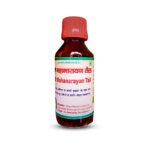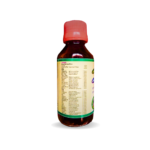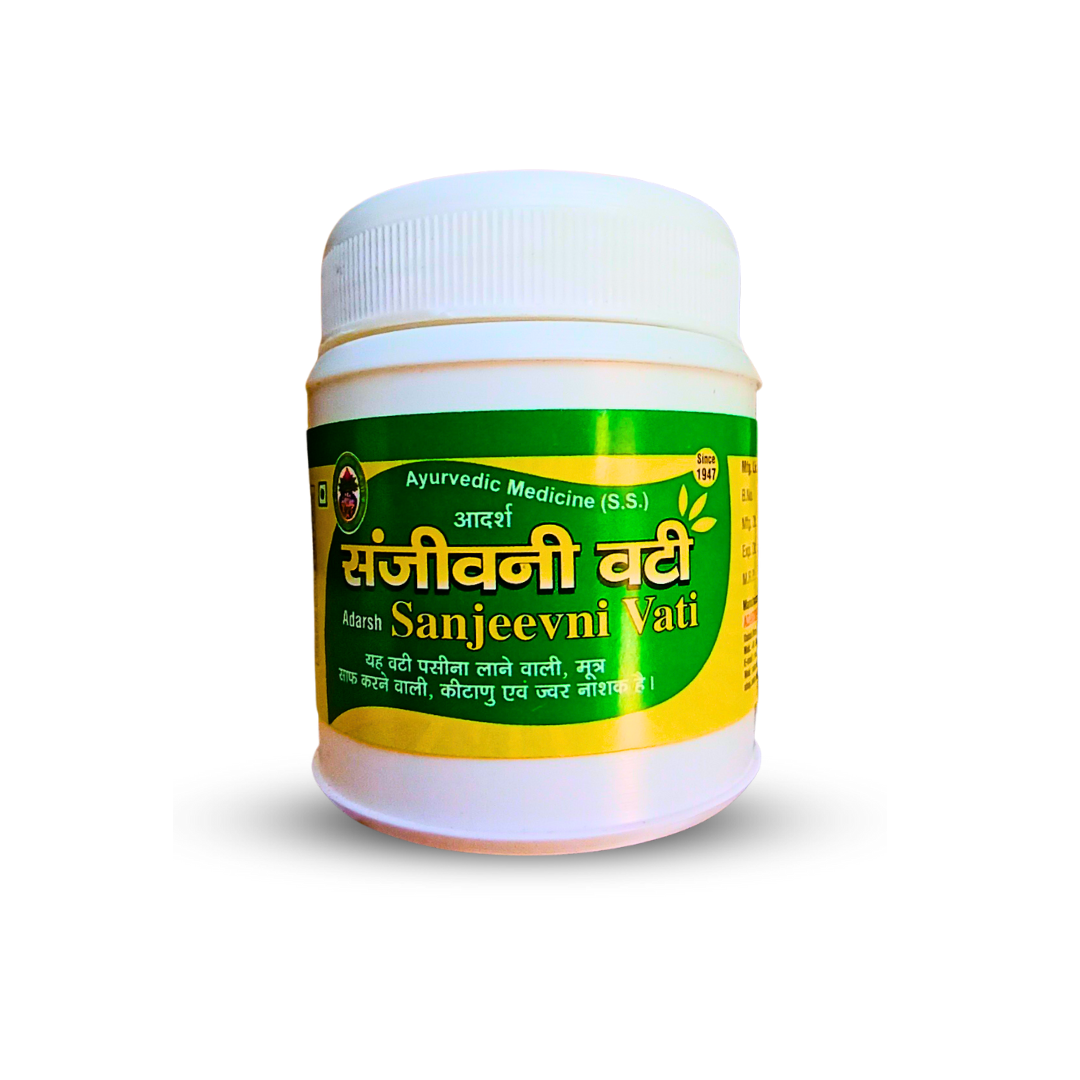Maha Narayan Tail
₹150 – ₹680
Maha Narayan Tail is typically applied topically to the affected area and gently massaged into the skin. The frequency and duration of use can vary based on individual needs and the guidance of a qualified healthcare professional. It is important to note that like all herbal remedies, Maha Narayan Tail may cause allergic reactions or other side effects in some individuals, and should be used with caution.
Maha Narayan Tail is an Ayurvedic herbal oil that is made from a blend of several herbs, including Bala (Sida cordifolia), Ashwagandha (Withania somnifera), and Manjistha (Rubia cordifolia). This oil is commonly used in Ayurvedic medicine for the treatment of joint pain, muscle pain, and stiffness.
- Delivery & Return
Delivery
We ship to all over the world. All orders are shipped with a UPS tracking number. Always free shipping for orders over 1000. During sale periods and promotions the delivery time may be longer than normal.Return
Adarsh Ayurvedic Pharmacy will accept exchanges and returns of undamaged box within 30 days of the date of purchase (14 days during the sales period), on presentation of the original till receipt at any store where the corresponding collection is available within the country of purchase. Your return will usually be processed within a week to a week and a half. We’ll send you a Return Notification email to notify you once the return has been completed. Please allow 1-3 business days for refunds to be received to the original form of payment once the return has been processed.Help
Give us a shout if you have any other questions and/or concerns. Email: aapdeepak.hdr@gmail.com Phone: 9897902760
Maha Narayan Tail is typically applied topically to the affected area and gently massaged into the skin. The frequency and duration of use can vary based on individual needs and the guidance of a qualified healthcare professional. It is important to note that like all herbal remedies, Maha Narayan Tail may cause allergic reactions or other side effects in some individuals, and should be used with caution.
Maha Narayan Tail is an Ayurvedic herbal oil that is made from a blend of several herbs, including Bala (Sida cordifolia), Ashwagandha (Withania somnifera), and Manjistha (Rubia cordifolia). This oil is commonly used in Ayurvedic medicine for the treatment of joint pain, muscle pain, and stiffness.
According to Ayurvedic principles, Maha Narayan Tail works by reducing inflammation, promoting healthy blood flow, and providing a warming effect to the affected area. It is believed to have analgesic, anti-inflammatory, and muscle relaxant properties, which makes it an effective remedy for joint and muscle pain.
Buy 10 get one free.
Selflife: 3 Years
| Weight | 250 g |
|---|---|
| Dimensions | 14 × 12.5 × 8.5 cm |
| Weight | 100ml, 200ml, 455ml |
Based on 0 reviews
|
|
|
0% |
|
|
|
0% |
|
|
|
0% |
|
|
|
0% |
|
|
|
0% |
Only logged in customers who have purchased this product may leave a review.
Related Products
Haritaki is another important herb in Ayurveda and is considered to be one of the most versatile herbs in the Ayurvedic pharmacopoeia. It is believed to have a wide range of health benefits, including promoting digestion, supporting healthy liver function, and improving cognitive function.
Together, Chitrak and Haritaki are believed to enhance each other’s effects, making Chitrak Haritaki a powerful herbal remedy for digestive disorders and other health conditions.
Chitrak Haritaki is commonly used in Ayurvedic medicine to treat a variety of health conditions, including poor digestion, constipation, abdominal pain, flatulence, anemia, and respiratory disorders. It is typically taken in powdered form, mixed with warm water or milk, or Chitrak Haritaki is an Ayurvedic herbal formulation made from two main ingredients: Chitrak (Plumbago zeylanica) and Haritaki (Terminalia chebula).
Anantmool, also known as Sariva, is an Ayurvedic herb derived from the roots of Hemidesmus indicus plant. The roots of this plant are used for medicinal purposes in Ayurveda.
According to the Ayurvedic Medicine book, Anantmool root is traditionally used to treat various health conditions such as hydronephrosis, syphilis, and leucorrhea. Hydronephrosis is a condition where urine accumulates in the kidneys, causing them to swell. Syphilis is a sexually transmitted infection that can cause long-term health complications if left untreated. Leucorrhea is a condition characterized by vaginal discharge.
Varunadi Kwath is typically prepared by boiling the herbal mixture in water and then straining the decoction before consuming. It is important to note that like all herbal remedies, Varunadi Kwath should be taken under the guidance of a qualified healthcare professional, as it may interact with certain medications or have potential side effects in some individuals.
Varunadi Kwath is an Ayurvedic herbal decoction made from a blend of several herbs, including Varuna (Crataeva nurvala), Gokshura (Tribulus terrestris), and Punarnava (Boerhavia diffusa).
Astak Loh Mandur is believed to work by improving the production of red blood cells and increasing the level of hemoglobin in the blood. It is also thought to have a detoxifying effect on the liver and improve liver function, thereby improving overall health and well-being.
As with any Ayurvedic medicine, it is essential to consult a qualified Ayurvedic practitioner or healthcare professional before using Astak Loh Mandur to ensure its safe and effective use. The dosage and duration of treatment may vary depending on the individual’s condition and other factors.
“Arogyavardhini” is an Ayurvedic herbal formulation that is traditionally used to promote overall health and well-being. It is believed to help support liver function, improve digestion, and boost the immune system.
The ingredients of Arogyavardhini of this specific formulation typically includes a combination of herbs and minerals such as triphala (a blend of three fruits), kutki (a bitter herb), guggulu (a resin), shilajit (a mineral pitch), Abarak bhasam , Loh Bhasam and others.
The unique formulation of Adarsh Aroghyavardhni has potency to burn fat and purify blood .
As with any herbal supplement, it is important to consult with a healthcare professional before taking Arogyavardhini, especially if you have any pre-existing medical conditions or are taking any medications.
Key Component:
1. Triphala: A blend of three fruits – amla, haritaki, and bibhitaki – that are known for their antioxidant and anti-inflammatory properties. Triphala is commonly used in Ayurveda to support digestion and overall health.
2. Kutki: A bitter herb that is commonly used in Ayurveda to support liver health and improve digestion. Kutki is believed to have anti-inflammatory, antiviral, and antioxidant properties.
Supari Pak is a herbal Ayurvedic formulation that is commonly used in traditional Indian medicine. It is a sweet and spicy powder made from various herbs and spices, with betel nut (supari in Hindi) being the primary ingredient.
Some of the key ingredients in Supari Pak include betel nut, cardamom, cinnamon, clove, ginger, and honey. These ingredients are believed to have a range of health benefits, such as improving digestion, reducing inflammation, boosting the immune system, and promoting healthy reproductive function.
Supari Pak is typically taken in small doses, usually one to two teaspoons a day.
Jatyadi tail is typically applied topically to the affected area and gently massaged into the skin. The frequency and duration of use can vary based on individual needs and the guidance of a qualified healthcare professional. It is important to note that like all herbal remedies, Jatyadi tail may cause allergic reactions or other side effects in some individuals, and should be used with caution.
Jatyadi tail is an Ayurvedic herbal oil that is made from a blend of several herbs, including Jatiphal (Myristica fragrans), Haridra (Turmeric), and Neem (Azadirachta indica). This oil is commonly used in Ayurvedic medicine for the treatment of various skin disorders, such as cuts, wounds, burns, and other skin irritations.
Badam Pak is made by grinding almonds into a fine powder and mixing it with sugar, ghee (clarified butter), and a variety of other herbs and spices, such as saffron, cardamom, and cinnamon. The ingredients are then cooked together over low heat until they form a thick paste.
According to Ayurvedic tradition, Badam Pak is believed to have a nourishing effect on the brain and nervous system, as well as to improve digestion and support overall vitality. It is also believed to have a calming effect on the mind, making it a popular remedy for stress and anxiety.
Chandanbala Lakshadi Tail is typically applied topically to the affected joint areas and gently massaged into the skin. The frequency and duration of use can vary based on individual needs and the guidance of a qualified healthcare professional. It is important to note that like all herbal remedies, Chandanbala Lakshadi Tail may cause allergic reactions or other side effects in some individuals, and should be used with caution.
Chandanbala Lakshadi Tail is an Ayurvedic herbal oil made from a blend of several herbs, including Chandan (Sandalwood), Bala (Sida cordifolia), and Laksha (Laccifer lacca). The oil is commonly used in Ayurvedic medicine to help relieve joint pain and inflammation.
Krimi Kutar Ras is an Ayurvedic medicine used for the treatment of intestinal worms and parasitic infections. It is made from a combination of various herbs and minerals, including Vatsanabha (Aconitum ferox), Pippali (Piper longum), Shuddha Gandhak (Purified Sulphur), and Tankana Bhasma (Borax).
However, it is essential to note that the use of Krimi Kutar Ras should be done under the guidance of a qualified Ayurvedic practitioner. Overdose or incorrect usage can cause adverse effects like stomach upset, vomiting, and diarrhea. It is also not recommended for pregnant and lactating women and child.
Eladi Vati is typically taken orally, and the recommended dosage and duration of use may vary depending on the individual’s condition and overall health. It is important to consult with a qualified Ayurvedic practitioner before using this or any other herbal remedy.
Although Eladi Vati is generally considered safe when taken as directed, some individuals may experience side effects such as stomach upset, allergic reactions, or interactions with other medications. It is important to speak with a healthcare provider before using this or any other herbal remedy, especially if you are pregnant, breastfeeding, or have any underlying health conditions.
Out of stock
According to Ayurveda, Sanjivani Vati is used to balance the Pitta and Kapha doshas in the body. It is commonly used for the treatment of fever, cough, cold, and other respiratory tract infections. It is also used to boost immunity and improve digestion.
Sanjivani Vati is known for its anti-inflammatory, antipyretic, and immunomodulatory properties. It helps in reducing fever, inflammation, and pain in the body, and also helps in boosting immunity and preventing infections. It is also beneficial for treating digestive disorders such as indigestion and bloating.































Reviews
There are no reviews yet.